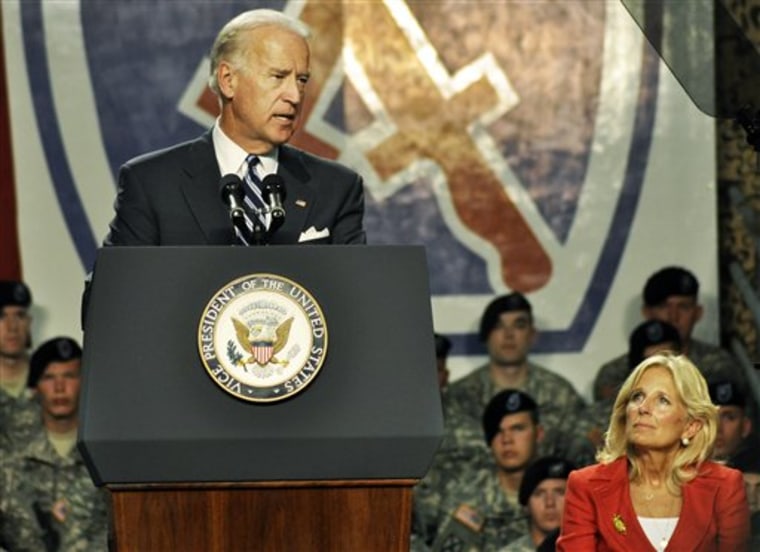Despite billions in aid from Washington and a shared threat from extremists, Pakistanis have an overwhelmingly negative view of the United States, according to results of a Pew Research Center poll released Thursday.
The survey also found that Pakistanis have grown less fearful of extremists seizing control of their country, perhaps reflecting gains that government troops have made against militants since early 2009.
Most Pakistanis want improved relations with the United States, according to the poll. But most view the U.S. with suspicion, support for American involvement in the fight against extremists has declined, and nearly two-thirds want U.S. troops out of neighboring Afghanistan.
Nearly six in 10 Pakistanis polled described the U.S. as an enemy and only one in 10 called it a partner.
Public attitudes in Pakistan figure importantly in the Obama administration's strategy for strengthening the U.S. partnership with Pakistan to help defeat al-Qaida and stabilize Afghanistan. Another U.S. worry is the prospect of Pakistan's nuclear weapons falling into the hands of militants.
The Obama administration persuaded Congress this year to approve $7.5 billion in aid to Pakistan over five years. Since the 9/11 attacks the U.S. had provided Pakistan with billions linked to counterterrorist work. On a visit to Pakistan last week, Secretary of State Hillary Rodham Clinton announced a raft of new aid projects worth $500 million.
Mistrust of the U.S. among Pakistanis appears due in part to Washington's decision to turn away from their country after enlisting its support to defeat the Soviets in Afghanistan in the 1980s.
"They vividly remember us walking out in 1989 and being left to deal with their own security situation on their own," Defense Secretary Robert Gates told a Pentagon news conference Thursday. "The notion that, under those circumstances and not knowing whether they could count on us to be there, that they would hedge in one way or another is not a surprise."
State Department spokesman P.J. Crowley said that the administration is aware of a "deficit of trust." "It is important to, over time, demonstrate to the people of Pakistan that the United States is genuinely interested in a different long-term relationship," Crowley said.
The U.S. is not directly involved in ground combat operations in Pakistan, but some dozens of U.S. troops are helping train Pakistani forces. The U.S. also has an unacknowledged program of launching airstrikes from drone aircraft at Taliban and al-Qaida figures inside Pakistan.
The strikes by CIA drones are widely unpopular in Pakistan. The Pew poll found that of those who had heard about drone attacks, 93 percent said they are a bad thing, 90 percent said they kill too many innocents, and 49 percent said they are being done without the Pakistani government's approval.
Without mentioning drone strikes, Vice President Joe Biden on Thursday rejected suggestions that al-Qaida is becoming entrenched in Pakistan and said the U.S. is making inroads against extremists.
"I assure you, we are doing significant damage to al-Qaida in Pakistan as well as in Afghanistan, so we're making progress," Biden said in an interview that was taped Wednesday at Fort Drum., N.Y., and broadcast Thursday on NBC's "Today" show. "But the truth of the matter is that there's more to go."
Despite receiving billions in U.S. aid since the Sept. 11, 2001, terrorist attacks, many Pakistanis believe the U.S. gives them little or none, according to the poll. About a quarter of those questioned said the U.S. provides a lot of financial aid. Nearly a quarter said it provides a little aid, 10 percent said the U.S. gives hardly any, and 16 percent believe the U.S. gives Pakistan no aid.
The poll also found that only eight percent of Pakistanis express confidence that President Barack Obama will do the right thing in world affairs — his lowest rating among 22 nations that Pew polled in April. Seventeen percent expressed a favorable view of the U.S., and 64 percent said it is important for relations with the United States to improve.
The Pew poll consisted of face-to-face interviews in April with 2,000 adults in areas of Pakistan that represent about 84 percent of the nation's adult population. The Federally Administered Tribal Areas — the region along the Afghan border where al-Qaida is believed to have found haven and where the Pakistani government has little control — was not included in the survey.
In its May 2009 survey of Pakistanis, Pew found that 69 percent were very or somewhat worried about extremist groups taking control of their country. That was one month after the Pakistani army began a large-scale offensive against extremists in the Swat Valley, some 100 miles from Islamabad.
This year's poll found that 51 percent expressed concern about a takeover by extremists.
Pakistanis also said they feel less threatened by the Taliban and much less by al-Qaida. The proportion who considered al-Qaida a serious threat fell from 61 percent last year to 38 percent this year. The equivalent numbers with regard to the Taliban fell from 73 percent to 54 percent.
The shift in opinion could be seen as a positive trend if it reflects actual setbacks for the extremists in battles with government forces.
But it also could cut the other way. If Pakistanis see less of a threat from militants, that could undercut U.S. efforts to persuade their government to expand its offensive against insurgents and to take on the groups of greatest concern to the U.S., including al-Qaida.
The poll also found that while the Taliban and al-Qaida are unpopular in Pakistan, negative views toward them have become a little less prevalent over the past year, while positive views have increased.
Eighteen percent said they view al-Qaida with favor, compared to nine percent a year ago and 25 percent in 2008. Fifty-three percent had an unfavorable view of the group, compared to 61 percent a year ago and 34 percent in 2008.
Not surprisingly, Pakistanis said the biggest threat to their country is longtime rival India.
